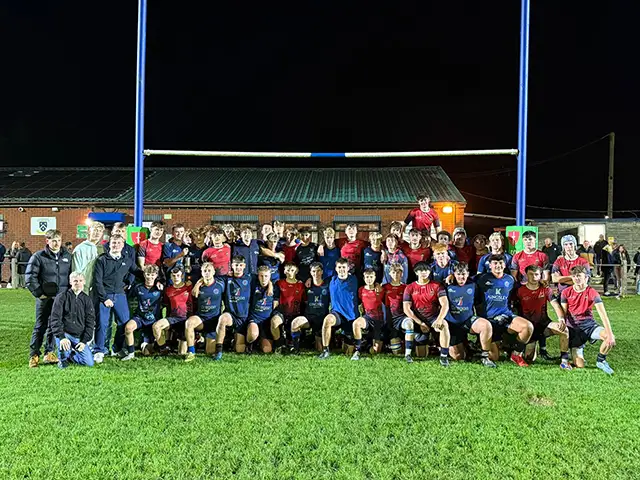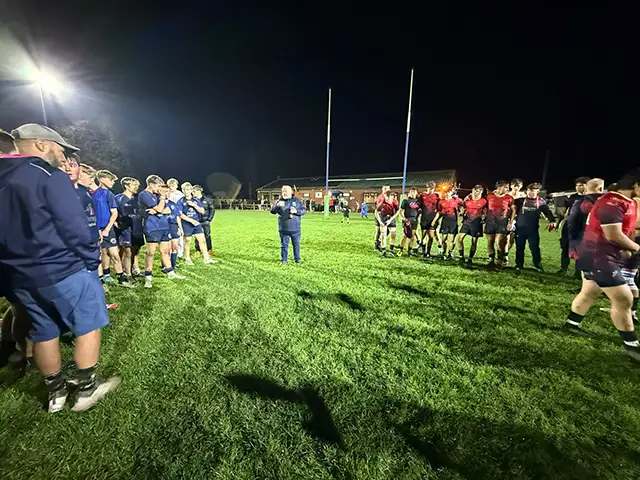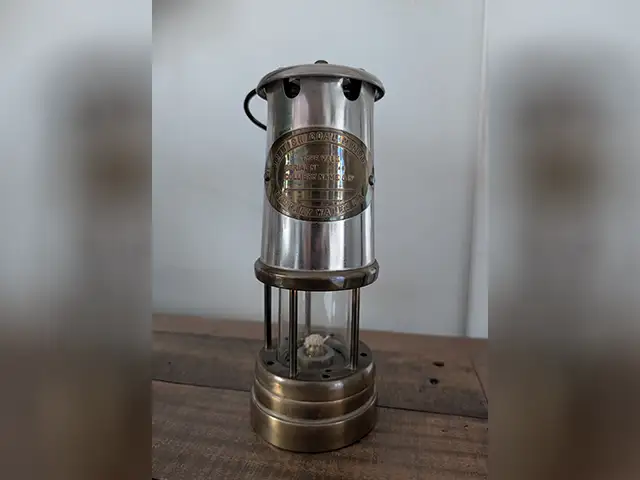Support quality, independent, local journalism…that matters
From just £1 a month you can help fund our work – and use our website without adverts. Become a member today

The Universal Colliery mining explosion of October 14, 1913, claimed the lives of 440 men and boys and devastated the Aber Valley community.
Ahead of the commemorations for the 112th anniversary of the disaster, Senghenydd RFC has created a new way to honour those who lost their lives on that fateful day.
On Friday October 10, Senghenydd RFC’s Under-16s, known as the Young Saints, faced Whiteheads RFC U16s under the floodlights of the Welfare Ground in the inaugural match for the newly established Universal Colliery Cup.
What began as an idea to raise funds for the team’s forthcoming tour soon grew into something much bigger – a community event blending sport, remembrance and local pride.
In a message shared on social media ahead of the game, club chairman Matthew Bateman reflected on the importance of the date and the role the new fixture plays in preserving Senghenydd’s heritage.
“October 14 isn’t just another day on the calendar,” he said. “For over a century now, this date brings back memories of one of the toughest days we’ve ever faced – the tragic mining disaster that changed Senghenydd forever.
“Our rugby club isn’t just about matches or trophies; it’s the heart of the community. Every year we make sure those 440 men and boys aren’t forgotten. Seeing the younger lads take the lead on this new memorial match fills us with pride. It shows that the values of respect and remembrance still mean a lot, even as faces change.”

Bateman said he hopes the Universal Colliery Cup will become an annual fixture – one that future generations look forward to as both a sporting challenge and an act of remembrance.
Friday night’s match certainly lived up to that vision. Led by captain Cameron Lewis, the Young Saints produced a spirited and emotional performance full of determination and sportsmanship before an enthusiastic home crowd.
Unfortunately for the home team, Whiteheads ran out 31–44 winners, but there was plenty of good rugby on display.
After the final whistle, Darren Burford, chairman of Senghenydd RFC’s Mini and Junior section, praised the commitment of both sides.
He said: “What a fantastic evening of rugby at the Welfare Ground. The Young Saints and Whiteheads put on a thrilling display full of grit, determination and heart. It wasn’t our night on the scoreboard, but we couldn’t be prouder of our lads – and huge congratulations to Whiteheads on a well-earned victory.”
He also thanked the visiting team, volunteers, match officials and supporters who turned out in force.
“This was the kind of night that reminds us why we love grassroots rugby. We hope it’s just the first of many Colliery Cup games to come.”
The trophy itself is a miner’s lamp, purchased by the U16s fundraising team – a fitting tribute to Senghenydd’s mining heritage. While the lamp will remain at the club as a permanent symbol of remembrance, Whiteheads RFC were presented with a commemorative certificate and took photographs with the trophy after the match.

The hope is that the Universal Colliery Cup will become a lasting tradition, played every year by each new Senghenydd U16s side as their final game before moving on from junior rugby. Organisers want it to grow into an annual fixture embedded in the local rugby calendar – one that other clubs will look forward to being part of in future years.
As the lights dimmed over the Welfare Ground and players from both sides shook hands, it was clear the evening had achieved more than any result could measure.
Through the Universal Colliery Cup, Senghenydd RFC’s young players have not only paid tribute to their village’s past but also laid the foundations for a new tradition – one built on unity, respect and the enduring spirit of a community that never forgets.
The 1913 disaster
The Senghenydd Mining Disaster remains the worst in British history. A methane gas explosion at the Universal Colliery on October 14, 1913, triggered a chain reaction that ignited coal dust deep underground.
A total of 439 miners and one rescuer were killed. It was the second major explosion at the pit – another in 1901 had claimed 81 lives — and subsequent investigations found that safety recommendations from that earlier tragedy had not been fully implemented.
There were around 950 men working underground when the blast struck. The last of the trapped miners were not recovered for more than two weeks, and the funerals lasted over a month. The mine manager was fined just £24 for safety breaches, while its owner, William Thomas Lewis, was fined £10.
Memorial service
A memorial service is being held on Tuesday to mark the 112th anniversary of the disaster.
The Aber Valley Heritage Group will host a service at 10am at the National Mining Disaster Memorial for Wales, on the site of the former Universal Colliery. The event will also be live-streamed on Facebook.
Last year, the memorial garden was formally recognised by the Welsh Government as the National Memorial for every mining disaster in Wales. The garden was originally opened on the 100th anniversary in 2013.
Support quality, independent, local journalism…that matters
From just £1 a month you can help fund our work – and use our website without adverts.
Become a member today
